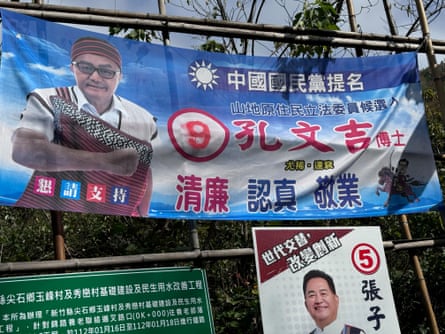In the northern region of Taiwan lies Hsinchu county, where a small group of inhabitants in Smangus gather every morning in a wooden shelter to discuss the day’s agenda. From their vantage point, they can see the majestic peaks that surround them.
The rural Atayal community, consisting of approximately 200 members, is getting ready for the upcoming presidential election on Saturday. This is a significant event for them, as they have been operating their own polling place since 2008 and actively engaging in discussions about the various candidates with all of the villagers.
According to community leader Lahuy Icyeh, political discussions are usually avoided during meetings but the upcoming presidential election is of great importance. The village elders are urging the tribe to carefully consider the best candidate for Taiwan.
This will be the eighth direct presidential election for Taiwan since the lifting of martial law in the late 1980s. The current president, Tsai Ing-wen, is unable to run again due to term limits. Her current deputy, Lai Ching-te, is running in hopes of maintaining the Democratic Progressive Party’s (DPP) control. He is competing against Hou Yo-ih from the national opposition party Kuomintang (KMT), which held power during the years of authoritarian rule, and Ko Wen-je, founder of the Taiwan People’s Party (TPP).
The focus of the campaign has primarily been on the Chinese Communist Party’s plans to take over Taiwan, but studies have revealed that the biggest worry for voters is economic matters such as inadequate pay, expensive housing, energy stability, and rising prices. In the year 2022, wages experienced the largest decrease in a decade, and the cost of housing in certain cities in Taiwan is among the highest in the world compared to income levels.
In 2023, the inflation rate of 2.48% was comparatively lower than that of other countries. However, the sharp increase in prices of certain items, like eggs, negatively impacted the perception of the cost of living. In addition, there are pressing issues such as childcare, elder care, corruption, judicial reform, education, and minority rights that require immediate attention.
The three candidates running for president have all promised to address major issues, but their pledges are mostly identical. Dafydd Fell, who is the director of the Centre of Taiwan Studies at Soas University of London, believes this has resulted in less debate, except for the controversial topic of Taiwan’s nuclear power plants. The release of any polls that could show the impact of these promises is prohibited during the 10-day blackout period before the election.
The Smangus community has specific requests, including improved support for the elderly, better roads, and recognition of land rights and justice for Indigenous tribes. However, due to its communal economy and job-sharing system, the village is shielded from certain economic problems.
According to Yarah Pihu, the Presbyterian minister and community leader in Smangus, the focus of the presidential election is on broader themes. They are seeking a candidate who has a global outlook and a strong sense of Taiwanese identity.
According to Masay Sulung, a leader in the Smangus community, the majority of Smangus residents are likely to support Lai Ching-te in the upcoming election. They have confidence in Lai’s leadership and believe he has a strong vision for the nation.
During a DPP gathering in Taipei, two university students, aged 20 and with surnames Huang and Chen, express their agreement with the party’s views on gender, Taiwanese identity, and elderly care. However, there are indications that the younger demographic, making up approximately 16% of the voting population, is shifting away from the DPP as they now view it as part of the current political establishment.
During a KMT gathering, a 34-year-old individual named Liu expressed his decision to switch from the DPP, citing his belief that governments should undergo frequent changes. In Guanxi township, Hsinchu province, another individual named Lee shares the same belief but does not support either Hou or Ko, leading her to choose not to vote.

Corruption is a significant concern for many Taiwanese voters. According to Fell, it is often the primary focus in Taiwanese elections and has had a significant impact on both local and national election outcomes.
“Following eight years in power, it may be assumed that the DPP is facing pressure from this matter, and the KMT has alleged various things. However, it is uncertain which party is ultimately responsible for this matter.”
Candidates have made a wide variety of accusations against one another, ranging from plagiarism to the possession of unlawful housing structures, questionable sources of income, and various types of misconduct. Previous local elections have been marred by claims of purchasing votes, bribery, intimidating voters, and connections to organized crime.
According to Kevin Luo, an assistant professor at the University of Minnesota, Taiwan has a history of “electoral machines” controlling local politics. These machines use patronage and connections with local factions to mobilize voters, a practice that originated during the authoritarian era. The strong influence of the KMT party machine in Miaoli is a prime example of this.
The New Bloom Magazine reported that the Taiwan Anti-Corruption and Whistleblower Protection Association found that 11.6% of 1,677 candidates for city councillor in 2022 had previous criminal records. In the county of Miaoli, this percentage was even higher, with more than 20% of candidates having criminal records.
On a Friday evening, Tseng Wen-hsueh, an independent candidate, is gathering a group of individuals at a temple in Miaoli county on the western coast of Taiwan. He is advocating for anti-corruption measures and political reform. The residents in this area have strong ties to different ethnic backgrounds and a significant number of them work for state-owned companies in the abundant natural resources sector. Over the past 72 years, Miaoli has consistently voted for the KMT party, regardless of national shifts in voting patterns. Locals jokingly refer to it as the “Nation of Miaoli”.
Tseng, speaking to the Observer, explains that Miaoli’s tightly controlled political atmosphere enables those in authority to act without restraint. He notes that after a prolonged period without change, many find it difficult to envision any improvements. As a result, they often opt to stick with the KMT in order to maintain stability in their personal lives.
“If a first-time winner emerges, the public will have faith in their vote, which is crucial. This will demonstrate the power of their vote and the potential for real change.”
Smangus, formerly considered the most isolated village in Taiwan, did not have access to electricity until 1980 and a connection to nearby villages was not established until 1995. The road leading to these villages, characterized by steep inclines and frequent landslides, is now heavily traveled by campaign vehicles and adorned with political advertisements.
However, in Smangus, the election outcome is mostly predetermined. For over a decade, the village has consistently supported the DPP, despite being surrounded by an area that is largely pro-KMT. The crucial point is that the residents actively participate in the voting process.
According to Icyeh, Taiwan adopted democracy at a later time compared to other regions. Therefore, it is crucial to select a leader who can safeguard and guide the country while also valuing the democracy that was fought for.
Source: theguardian.com


















